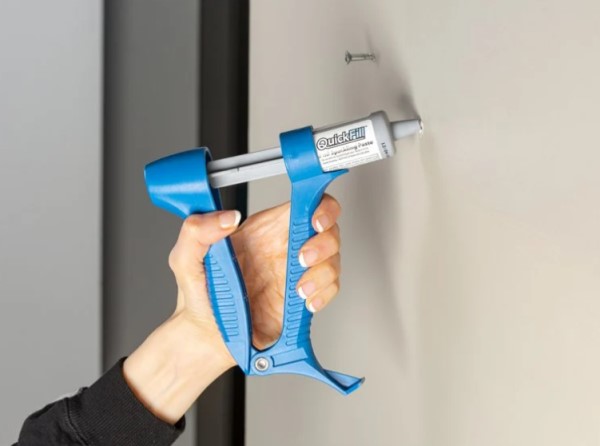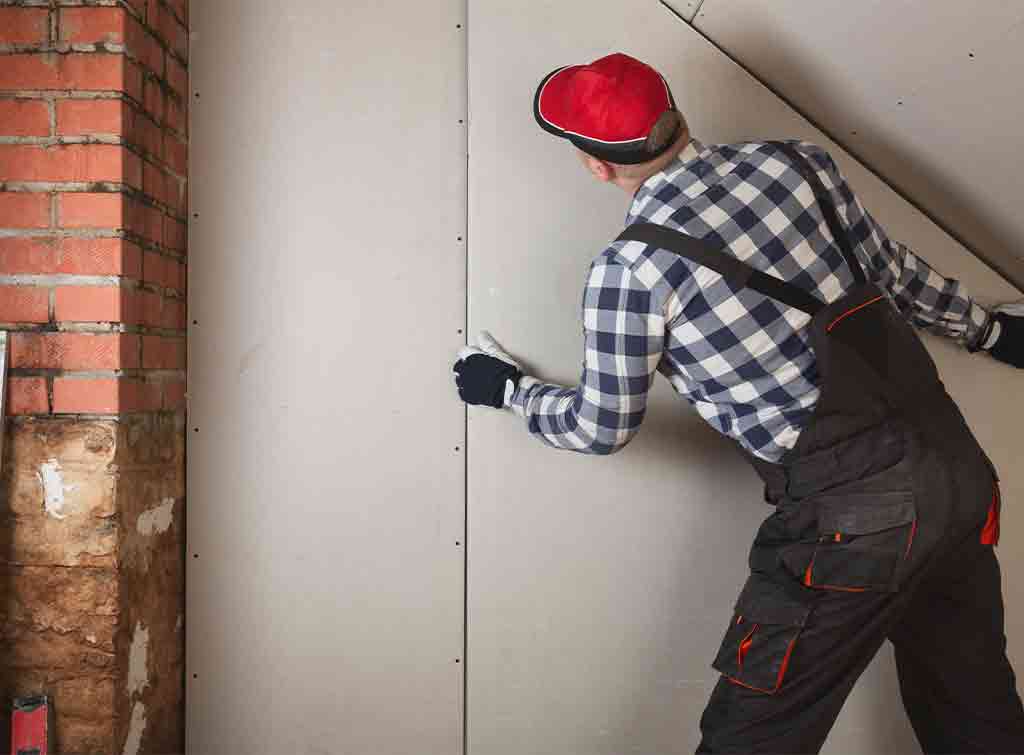Drywall, also known to be gypsumboard or a plasterboard is an ceiling or wall material. Drywall is made up of a core of plaster gypsum , sandwiched between two layers of either fiberglass or paper.
Holes and dents Drywall is easily damaged by doorknobs, furniture or by accidental impact.
Damage to the wall: When drywall is exposed water, it can warp, discolor or even turn moldy.
The shifting or settlement of the foundation may cause cracks to form in the wall.
Aging: Over time the drywall can become hard and show cracks and other signs of wear.
Work in electrical or plumbing If plumbing or electric is installed, holes will have to made into the wall before being repaired.
Drywall repair generally involves filling in holes and cracks with joint compound Sanding, and finally painting the area to match the surrounding area. In extreme cases, parts of the drywall may have to replaced completely. It is important that you tackle drywall repair issues quickly so that you can avoid any further harm. See the best do you agree on drywall calgary contractors for more tips including best drywall installers near me, drywall and plastering contractors near me, drywall and plastering contractors near me, drywall companies, local drywall repair, drywall experts near me, sheetrock contractors near me, drywall specialist near me, drywall companies, drywall guys and more.

What Happens To The Wall And What Can Be Done To Fix It?
The process of repairing drywall includes several steps. This involves the insulation and framing process, as well as soundproofing as well as patching, tapering and mudding. Here is an overview: Framing. The framing may be repaired or replaced in the event that the damage to the wall results from structural problems.
Insulation The possibility exists to install insulation in the wall cavity after framing is in place. This is especially true for walls that are exterior, or walls which divide living spaces.
Soundproofing: Add the soundproofing layer between framing or drywall to increase soundproofing. This will help to reduce noise transmission between rooms.
You'll need to patch any damaged drywall after the insulation, framing and soundproofing is completed. This might mean cutting the damaged portion and replacing it with a new section of drywall.
Taping: To create a smooth surface, you need to tap the joints between the pieces of drywall once they are in place. This is done by applying joint tape over the joints, and then feathering the edges using joint compound.
Joint compound is put on after the tape has been sprayed to fill in any gaps and smoothen out the surface. To create an even surface, you might need to apply several coats of the joint compound. Between each coat, you should sand it.
Painting: Once the joint compound is dry, you can paint the drywall to match your room. It may take several coats to achieve the desired look.
Although drywall repair can be time-consuming but it can be accomplished with professionalism and care.

Here Are Some Helpful Tips And Suggestions On How To Select The Right Drywall Contractor. Drywall Contractor
Choosing the right drywall contractor is important to ensure that the project is completed on time and within budget and the highest standards. Here are some tips to assist you in choosing the best drywall company. Refer your family, friends and acquaintances. Recommending family and friends is usually the most effective method of locating a reliable contractor.
Search online for reviews about local drywall contractors. This will give you an idea about their reliability and their quality.
Be sure to verify credentials: Make sure you are licensed, insured and appropriately secured. This will protect you from any damage or accidents that may occur during the construction.
Request estimates: Request written estimates from at minimum three contractors. This will provide you with an overview of the price range and help you spot any warning signs.
Ask questions: Do not be shy to ask questions about the contractor's experience as well as their processes and their materials. A good contractor will be willing to answer any questions you may have and explain their method.
Communication skills are essential Find an expert who communicates effectively and be responsive. It will guarantee that the project is completed on time and you are pleased with the final results.
References: Request references from the contractor, and then follow-up with them. This will help you get an idea of the contractor's work as well as professionalism.
These guidelines will help you find a reputable and experienced drywall contractor for your project.